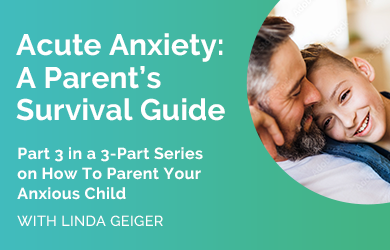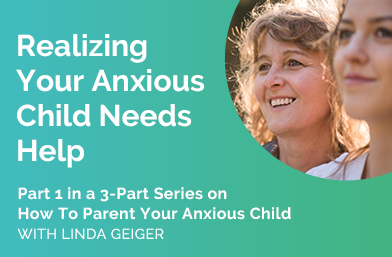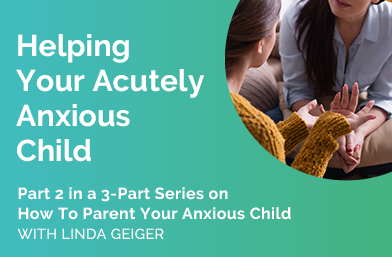The Other Patient
Part 3 in a 3-Part Series on How To Parent Your Anxious Child from Linda Geiger
In my two previous articles in this series, I focused on the patient, your child suffering from acute anxiety.
I discussed how to identify acute anxiety disorders and provided advice on how to move from accommodating to supporting your child.
However, acute anxiety’s impact extends well beyond the patient themself. While nurturing your acutely anxious child, it’s easy to forget or just ignore the fact that you need support yourself.
Your own well-being is just as vital.
Simply stated: you can’t support your acutely anxious child effectively if you don’t help yourself. In this article, I’ll share my own experiences and suggest some ideas to help you survive this difficult journey with your emotional strength intact. Some of these ideas became my own parent’s survival guide.

Parenting through the Crisis: a Unique Challenge
My earlier articles referenced some of the powerful emotions I felt as my son wrestled with acute anxiety.
These included feelings of fear, inadequacy, a loss of control, depression, frustration, and even panic. As you identify acute anxiety and begin to understand your child’s symptoms and the recovery process, knowledge is indeed empowering. However, even armed with this knowledge and the best advice and support, parenting your anxious child is arduous and emotionally draining. For me, the lack of meaningful support from traditional medical and educational institutions compounded this problem and built a feeling of isolation. As a result, the whole journey was a lonely, frustrating, and heartbreaking endeavor.
Parenting a child through a period of mental illness is a unique challenge.
When a child suffers from a debilitating physical ailment, your community of family and friends usually rallies to assist the family. They offer food, transportation, advice, and moral support. But parenting an acutely anxious child is a lonely experience. The condition is misunderstood. Well-meaning advice of family and friends often comes across as judgmental, essentially questioning your parental skills and competencies. This can cause you to lose confidence in your abilities and challenge your long-held beliefs about effective parenting.
Believing in Yourself
Friends and family often dispense standard advice: set firm boundaries, withdraw privileges, and implement a reward system.
These strategies may work with a neuro-typical child but fail spectacularly with children whose amygdala is over-activated.
You need to have the confidence and clarity of thought to recognize the unique situation facing your child and firmly disregard those recommendations, however well-meaning. They simply don’t apply to your acutely anxious child; with some friends and relatives, unfortunately, it doesn’t help you to tell them!
Once you have established your child’s diagnosis and identified resources to support your child, you just need to believe in your approach. However, this requires strength and self-confidence at a time you may be feeling frightened and fragile. Consequently, you need to take care of yourself and nurture your emotional resources for what can be a protracted struggle. So often, parents must help themself before they can help their families.
My Parent Mantra
When the exhaustion, shame, and frustration of floundering with an anxious child wore me down, I developed my own coping strategy.
I composed a mantra that helped me face my own emotional challenges.
During the worst times of my struggle, I recited this daily to bolster my spirits and resolve. Perhaps you can use some of these ideas to strengthen and support yourself through the journey of helping your anxious child.
- I am the best parent I can be for my child.
- Biology and genetics play a prominent role in my child’s experience of anxiety.
- I did not cause my child’s anxiety, but I can be part of the solution.
- I do not control everything that happens to my child, but I can control how I react to situations.
- I will do whatever it takes to reach the best possible outcome for my child.
- I am hopeful and will remain decisive, inquisitive, and proactive in finding help for my child.
Focusing on these truths can help you maintain perspective and confidence as you support your child through their struggle with an acute anxiety disorder.
Supporting Yourself
This mantra helped me. But If the stress of managing your acutely anxious child becomes overwhelming, remember there are resources to help.
Mental health practitioners can help you work through the feelings of fear, anxiety, and loneliness that accompany your parenting journey. There are also support groups for parents experiencing similar feelings, perhaps for different reasons. For example, the National Alliance on Mental Illness has nearly a thousand support groups across the country and other resources such as helplines and online discussion groups.
Whatever your preferred method, it’s vital that you receive the help you need.
Handling the relentless pressure alone or even with a close partner is not a recipe for good mental health.
Treating the Whole Family
Once my child had been diagnosed with an acute anxiety disorder, and he received treatment, my concerns did not dissipate.
Even after receiving professional help, my greatest fear was that I would undermine his clinical progress with ineffective parenting, thereby exacerbating the problem. I was concerned old patterns would reemerge as my child resumed his life when his residential treatment ended. In my case, although I realized I was not the cause of my child’s anxiety, I needed to be part of the solution.
Consequently, when we founded Anxiety Institute, one additional concept drove our planning…
Effectively combatting acute anxiety requires solutions not just for the affected children but for whole families.
That’s why our intensive outpatient treatment includes parent support groups, psycho-education, and family therapy as critical components of your child’s treatment.
Summary
Supporting a child suffering from acute anxiety is a challenging endeavor.
It starts with awareness of the condition and understanding of the best approaches to support rather than accommodate your anxious child. Whatever you’re experiencing, remember that accurate diagnosis and treatment will permanently improve your child’s biological development. With the right approach, you will make it through this challenging time together. You are helping your child build skills that will empower them to analyze and accurately navigate anxiety provoking situations for the rest of their lives.
As a responsible and loving parent, you must maintain a realistic view of your role.
You need to be there for your child’s critical, emotional moments, but you also need to be emotionally available for the rest of your family, and address work and other responsibilities you may have. Husbanding your emotional resources is critical.
Furthermore, whatever conflicting parenting advice you may receive, it’s vital that you steadfastly focus on providing your child with an appropriate response. The Parent Mantras helped prepare me emotionally to assist my acutely anxious son. Remember, it takes a whole family working together to tackle the hard work of healing. This is the essential work required to free children from anxiety’s grip and enable them to reach their full potential.
My meandering journey from a bewildered mom to the co-founder of Anxiety Institute involved a great deal of learning. Those powerful negative emotions have long dissipated, but I remember them vividly, and I have deep empathy for anyone new to acute anxiety. I hope that this description of my journey and some of the insights I gleaned through working with leading professionals in the field will help and support you on your own path.
In this series...
Realizing your Anxious Child Needs Help
Part 1 in a 3-Part Series on How To Parent Your Anxious Child
from Linda Geiger
Helping your Acutely Anxious Child
Part 2 in a 3-Part Series on How To Parent Your Anxious Child
from Linda Geiger
Our Work at Anxiety Institute
Anxiety Institute is the only clinical research practice specializing in acute anxiety disorders that uses advanced, proven techniques while nurturing the patient in their local home environment.
Utilizing the most up-to-date, evidence-based treatments, our outpatient services focus on treating teens and young adults while coaching the parents who guide them.
Located in Greenwich, Connecticut, and Madison, New Jersey, we serve local, national, and international clients and their families. Learn more about our advanced anxiety treatment for adolescents and young adults at www.anxietyinstitute.com
To schedule a free consultation, please contact us at (203) 498-0888 (CT) or (973) 360-8400 (NJ).
“My personal knowledge and experience of anxiety and fear, as a victim and as a conqueror, has gifted me the valuable asset of emotional intelligence. Knowledge and experience that will give me the empathy to connect with others and the grit to overcome adversity.”




